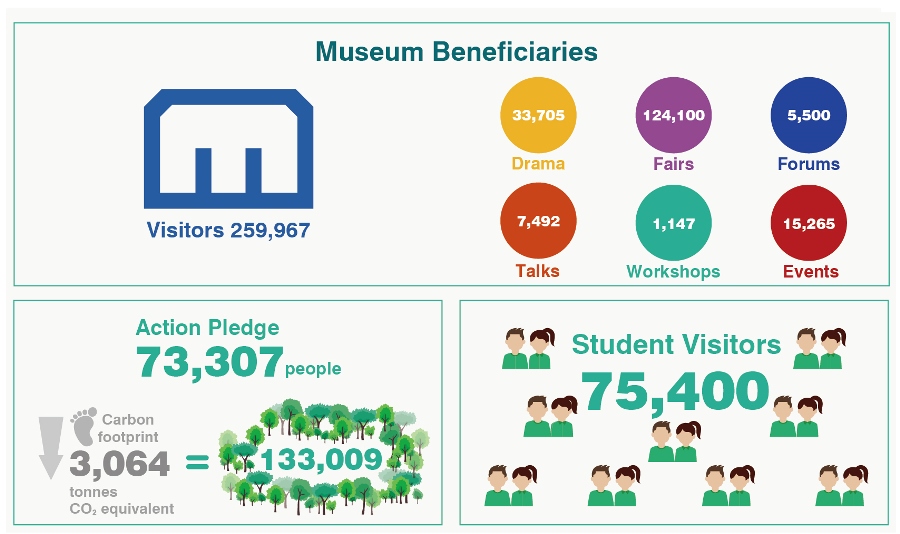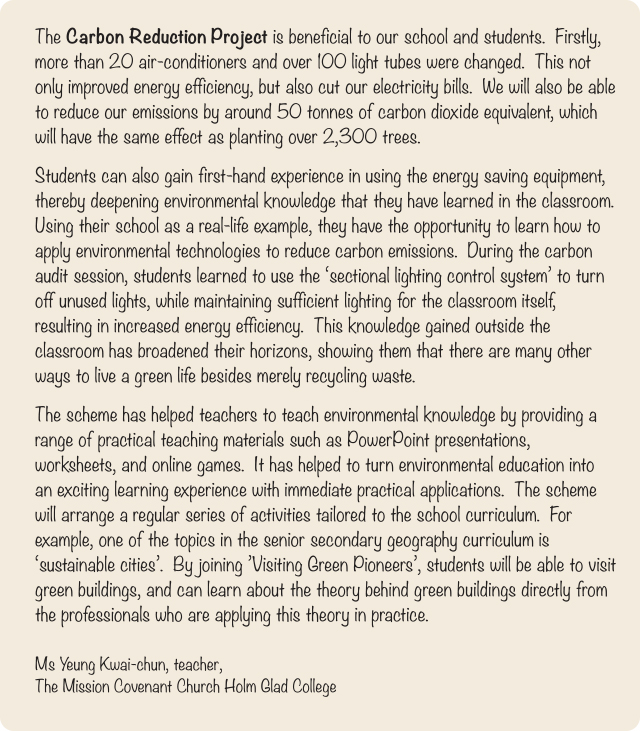Passing on the Torch
In 2012 the Chinese University of Hong Kong launched a five-year community engagement programme, ‘CUHK Jockey Club Initiative Gaia’ (Gaia), with funding from the Hong Kong Jockey Club Charities Trust (HKJC). One of the earliest initiatives undertaken in the Gaia programme was the establishment of the Jockey Club Museum of Climate Change, the first museum of its kind in the world. Through various educational projects and extended activities such as the Drama of Climate Change, the Environment and Climate Change Forum Series, Green Mini Movies Festivals, and Environment Fairs, the Gaia programme seeks to educate the public about climate change and to provide a platform for knowledge exchange so as to strengthen our ability to combat its negative consequences.

The‘Go Green Community – Jockey Club Carbon Reduction Partnership Scheme’ was a major initiative under the Gaia programme. Aimed at building a low-carbon living environment, the scheme provided professional analysis and effective carbon-reduction strategies to participating schools and NGOs (‘Go Green Citizens’). During the first phase of the scheme, the team visited 59 Go Green Citizens to conduct carbon audits and formulate carbon reduction strategies. Thereafter, a ‘Carbon Reduction Project’ helped 37 schools and 2 NGOs to acquire energy-saving equipment to replace its existing stock. It is estimated that the project will help the schools and NGOs reduce their emissions by over 1,800 tonnes (in terms of carbon dioxide equivalents) and reduce electricity consumption by 3.3 million kWh a year, equivalent to a saving of HK$4.1 million in electricity expenses.


From 1880 to 2012, the global average temperature has risen by 0.85℃, but in just four years (2013 to 2016), the global average temperature has risen by 0.25℃(1). Studies also show that the rate of warming is speeding up(2). At the same time, the atmospheric carbon dioxide level exceeded 400 parts per million in 2015. Recently, in October 2017, it has reached a new high to 407 parts per million. This is a worrying situation.
The Paris Agreement proposed a target of limiting the global average temperature rise to within 2℃, compared to pre-industrial levels, and if possible keeping it below 1.5℃. Unfortunately, the World Meteorological Organization confirmed that 2016 was the hottest year on record and that temperatures were about 1.1℃ higher than in the pre-industrial period3. Keeping rising temperatures under control will clearly be a long and difficult process.
Climate change has become a major challenge for our generation. Nevertheless, although the reality we face is discouraging, we should not give up easily. ‘Think Global, Act Local.’ In the past five years, the values of Gaia has been gradually gaining ground in Hong Kong. We will continue to provide a firm base for Hong Kong’s struggle to mitigate the effects of climate change.
In 2017, HKJC pledged its support for a three-year initiative of the Museum: ‘JC–CUHK Climate Action’. During the next three years, we will continue to organize a variety of environmental education activities to help the people of Hong Kong to understand the potentially devastating effects of climate change and to suggest innovative solutions.
References
- NASA (2017). Global Temperature. Retrieved from https://climate.nasa.gov/vital-signs/global-temperature/
- Hartmann, D.L., A.M.G. Klein Tank, M. Rusticucci, L.V. Alexander, S. Brönnimann, Y. Charabi, F.J. Dentener, E.J. Dlugokencky, D.R. Easterling, A. Kaplan, B.J. Soden, P.W. Thorne, M. Wild and P.M. Zhai (2013). Observations: Atmosphere and Surface. In: Climate Change 2013: The Physical Science Basis. Contribution of Working Group I to the Fifth Assessment Report of the Intergovernmental Panel on Climate Change [Stocker, T.F., D. Qin, G.-K. Plattner, M. Tignor, S.K. Allen, J. Boschung, A. Nauels, Y. Xia, V. Bex and P.M. Midgley (eds.)]. Cambridge University Press, Cambridge, United Kingdom and New York, NY, USA.
- World Meteorological Organization (2017, January 18). WMO confirms 2016 as hottest year on record, about 1.1°C above pre-industrial era. Retrieving from https://public.wmo.int/en/media/press-release/wmo-confirms-2016-hottest-year-record-about-11%C2%B0c-above-pre-industrial-era








